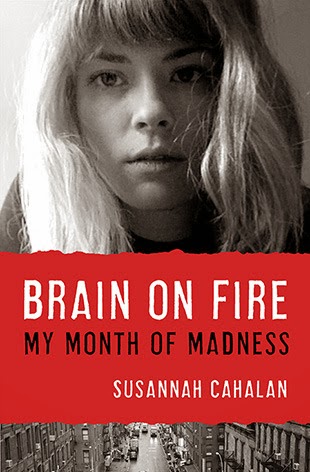Title: Brain on Fire: My Month of Madness
Author: Susannah Cahalan
Publisher: Free Press
Pages: 264
Format: Paperback
Source: Received from Turkish publisher for review.
Description:
A gripping memoir and medical suspense story about a young New York Post reporter’s struggle with a rare and terrifying disease, opening a new window into the fascinating world of brain science.
One day, Susannah Cahalan woke up in a strange hospital room, strapped to her bed, under guard, and unable to move or speak. Her medical records—from a month-long hospital stay of which she had no memory—showed psychosis, violence, and dangerous instability. Yet, only weeks earlier she had been a healthy, ambitious twenty-four year old, six months into her first serious relationship and a sparkling career as a cub reporter.
Susannah’s astonishing memoir chronicles the swift path of her illness and the lucky, last-minute intervention led by one of the few doctors capable of saving her life. As weeks ticked by and Susannah moved inexplicably from violence to catatonia, $1 million worth of blood tests and brain scans revealed nothing. The exhausted doctors were ready to commit her to the psychiatric ward, in effect condemning her to a lifetime of institutions, or death, until Dr. Souhel Najjar—nicknamed Dr. House—joined her team. He asked Susannah to draw one simple sketch, which became key to diagnosing her with a newly discovered autoimmune disease in which her body was attacking her brain, an illness now thought to be the cause of “demonic possessions” throughout history.
With sharp reporting drawn from hospital records, scientific research, and interviews with doctors and family, Brain on Fire is a crackling mystery and an unflinching, gripping personal story that marks the debut of an extraordinary writer.
My thoughts:
Those who saw me reading this kept asking me how it was going so far. And when they saw I gave it 5 stars, they asked me if I really liked it. And my answer is that I LOVED IT. The short version of why I did is that it satisfied me both in the journalism and a story telling sense. And the subject matter was something I was interested in, which led to my loving it.
I think any kind of illness, but especially one even doctors can't put a name on must be the worst thing that can ever happen to a person. Medicine even has a solution for cancer, which is considered to be one of the worst things, if it's detected early and everything works out, yet I felt like human kind knows very little about the mechanics of the brain after reading Brain on Fire. As far as I understand, when someone's considered to have gone "crazy," they don't know if it's something physical or mental or emotional causing it. That was the case for Susannah Cahalan; the blood tests, the EEGs and everything else you can think of were useless to find out what was going on with her.
I must admit Susannah was living my dream until she got sick. After graduating from journalism school, she was working at The Post in New York as a reporter, writing on several topics, interviewing people... And I was very jealous of her.
Her sickness sort of started when she thought there were bedbugs infecting her apartment. First, due to her weak state, people around her think she caught a cold, and then a doctor announces she has mono. Then we watch Susannah go "crazy," which seems to unfortunately happen very quickly, and watch her get back to her own self with the support of her boyfriend, mother, father, brother, friends and through efforts of the doctors who obviously value people and their lives. She was a dedicated worker, a talkative, fun and friendly person before she got sick. But with the illness, she becomes someone who thinks people on TV are spying on her, who stares at walls and yells at her father to get the hell out when he tries to visit her at the hospital.
Susannah admits right from the beginning that she doesn't remember what she's gone through, what happened when she went "mad." It was very obvious she did a lot of research about what went on with her as well as the illness itself. She filled in the blanks by talking to people who were around and by using the diary her father kept all through it. Her medial research, in fact, was so detailed that I got kinda nauseous while reading the part about her brain surgery.
Susannah also admits that she isn't completely herself ever since she beat the "madness." The first thought that goes through her head when she hears a weird noise or sees a bug is "am I going crazy?" She also talks quite a bit about the aftermath of the illness. When she finally goes back to her job at The Post, she builds up the courage to write about what she went through. After her article was published in The Post, there were a lot of people who got in touch with her to ask for advice, to just talk to and to thank to thank her.
If the subject matter interests you, I think you're going to love this book. It's also a very fluent, quick read.




